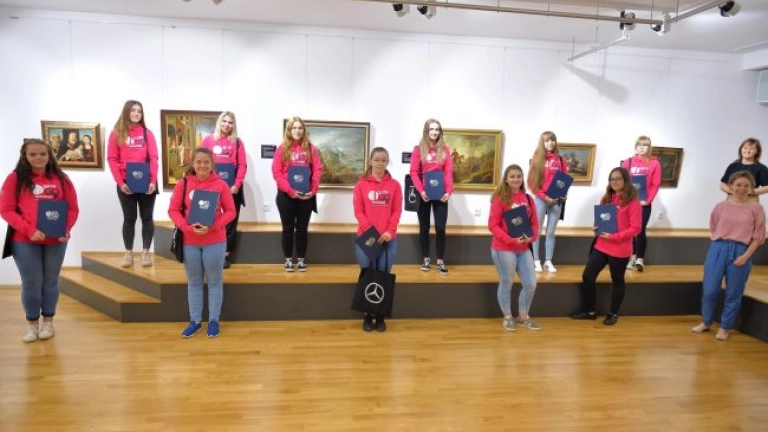Girls GO Technology – why the workshops prepared by Mercedes proved to be a hit?

Mobile applications, websites, self-presentation, innovative businesses and the secrets of getting a dream job – these are the issues that tamed 16 girls for six months as part of Girls GO Technology – a Mercedes-Benz Manufacturing Poland project addressed to students from the Jawor Region and the surrounding area.
Is the stereotype that exact sciences are dedicated to boys real? For six months, students of PCKZiU from Jawor and the European High School from Zgorzelec checked if the technology is for girls. Once a month they met with experts to gain knowledge that would help them find their place on the labor market and compete for future positions.
The first meeting took place in February at the Regional Museum in Jawor. The girls learned the tools for designing mobile applications and their operation from the inside. Using AppInventor, they created their first mobile applications and faced game design. During the classes, they also had the opportunity to test their projects on phones. The workshop was conducted by representatives of the Girls Code Fun Foundation.
Due to the pandemic, another 4 workshops were moved to the network. In March, Girls GO Technology participants turned their rooms into small front-end offices for several hours and broadened their programming skills. They found out, among others what is IDE, GIT, HTML, CSS, JQuery, front-end, API. Under the supervision of a specialist, using the tools for online meetings, they designed their first websites. They learned modern techniques and tracked what building site of the application looks at, which the user sees and with which other users interact. They also received tips on where to look for further sources that will enable them to develop the project, and how to learn to program at home.
The April classes were organized in cooperation with the “INVEST-PARK” Wałbrzych Special Economic Zone and the INVEST in EDU Educational Cluster, Project Partner. The girls learned how start-ups work, what are the pros and cons of innovative business and what challenges young entrepreneurs face. The participants created, among others platform plan for effective, remote learning. It was a real answer to the needs of the young generation nowadays. Good organization, transparency, ease of communication and planning are key features of the platform that they drew attention to.
Self-presentation and public speaking were the topics of the May workshop. During classes, the girls discovered the importance of body language and tone of voice. They checked how our emotions, attitude and choice of words influence someone who hears about our idea. Thanks to such a meeting, they know how to speak so that they can be listened to.
The last workshop in this series discussed issues related to applying for a dream job. Beata Wolska from Randstad talked about how to create a CV, how and where to look for a job, what is important during a recruitment interview and what candidates are looking for today.
The coronavirus pandemic has accelerated the digitization of all areas of life, especially science and business. Companies, schools and universities quickly moved people management to the network – and it turned out to be the most common and effective way to deal with the crisis. Digitization of processes and properly prepared infrastructure have allowed for a very quick and smooth transition to remote work mode. Work and study returned to their basic meaning: it ceased to mean the place of its performance – such as a company or school – and began to mean cooperation and action. It turned out that physical distance does not have to and should not mean social distance. The progressing digitization and robotization of processes combined with home office have revealed the importance of digital competences and soft skills such as creativity, flexibility, pro-activity, innovation, courage and the ability to test new solutions and learn from failures. This is exactly what we teach young women in our workshops. Girls acquiring such skills will be perfectly prepared and able to manage and coordinate future crisis activities.
The official end of the project took place on June 29 at the Regional Museum in Jawor. IT technology students have received certificates. They also had the opportunity to visit the exhibition “Jawor – a new chapter in the history of Mercedes-Benz.”
“Girls Go Technology” is a Mercedes-Benz Manufacturing Poland program targeted at girls from high schools and technicians from the Jawor Region and the surrounding area. It was created in 2018 with a view to instilling in young women the belief that technology is friendly and can be a great idea for professional life.
The partners of “Girls GO Technology 2020” are: Siemens Polska, WSEZ “INVEST-PARK”, Educational Cluster Invest in EDU, Stabilis, Girls Code Fun Foundation, Randstad Polska.